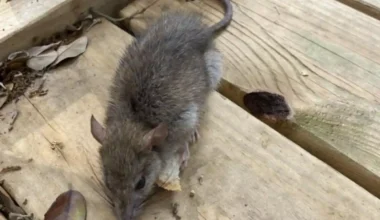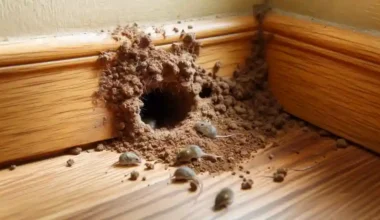Do rats hate the smell of vinegar? No one likes having rats in their house. If you’ve found one or signs of many near your home, here’s an easy fix: take a quick trip to your pantry. Soak some cotton balls in white vinegar and put 10-15 groups of them in your basement or garage. This will mess up the rats’ sense of smell, so they won’t be drawn to areas they usually like. Just change the cotton balls when the vinegar smell fades.
Rats live in gross spots and eat almost anything, so it might seem weird that vinegar keeps them away! But don’t stress – it’s not as crazy as it sounds. Let’s quickly talk about how rats’ noses work, so you get why things like vinegar can make them go away. But first…
Do Rats Hate the Smell of Vinegar?

Rats hate the smell of vinegar. Vinegar has an unpleasant smell that can be used as a repellent for rats. Some people have found that using vinegar around their homes can help keep rats away. It seems that the strong odor of vinegar is something that rats find unappealing. It is not specified whether a particular type of vinegar is more effective, but some suggest using white vinegar or apple cider vinegar for this purpose.
Also, vinegar can be combined with other scents that rats dislike, such as peppermint oil. This combination might create a more potent rat repellent.
Do Rats Have Strong Sense of Smell?
Let’s start with the babies – baby rats are born without eyesight, and it takes about 2 to 3 weeks for their eyes to start working. During this time, they depend on their sense of smell for everything, like finding their mom for food. As they get older, their sense of smell improves even more.
Rats rely a lot on their amazing nose for almost everything they do. They can smell predators, locate food, and even use their nose to find their path back.
Rats can smell really well, and besides vinegar, there are many other smells they really don’t like. If you’re curious and want to know more, you can read our article about scents that rats hate and how you can use them to keep rats away! Just visit the article to learn more.
Rats Sniff Out Food With Their Noses
You might think, “That’s not too impressive.” Yep, humans can use noses to find food – remember that toucan in the cereal ad? But here’s the cool part: rats can actually smell food from more than ten miles away.
They can even figure out if there’s food in your house without even going in. And guess what? They can smell us before they even see us moving around!
Rats use their super sense of smell to find hidden food faster than other animals that look for scraps. If they couldn’t do this so well, they wouldn’t be as good at finding food.
Rats Can Sniff-Detect Predators
Although these rodents might seem big and frightening, they’re actually quite timid and not good at fighting. They have many animals that like to eat them, such as hawks, owls, snakes, cats, dogs, and even humans.
Simply put, anything larger than a rat can easily catch and eat it, and this happens quite often. So, rats need to be very cautious.
Rats usually use their sense of smell to know if predators are nearby, even before they spot them. They can even tell if predators are around by smelling their droppings.
Rats Depend on Their Sense of Smell to Locate Mates
You might know that rats and mice have small bladders and sometimes leave tiny drops as they hurry around in the dark.
Even though it might sound yucky, this is actually crucial for rats because they can learn a lot from those small drops.
Just from those tiny drops, rats can figure out if another rat is a boy or a girl, how grown up they are, if they’re popular, if they’re friendly or not, and even if girl rats are ready to have babies. It’s like checking their social media to know everything they share!
The boy rats leave the most marks, but girl rats also release these drops to tell the boys they’re ready to make babies. Their noses help them learn so much about each other.
Rats Can Detect Weather Changes
Absolutely true. Rats have super noses that can sniff out when the temperature is changing and when a big storm is on the way.
They have to be smart about it because strong rain, hail, or snow can be really dangerous for them. So, they know when it’s time to find a safer place during bad weather.
Rats Have More Scent Receptors Than Dogs
As explained by the National Library of Medicine, rats can figure out where a smell is coming from in just one or two sniffs. They do this by passing the smell from one nostril to the other to understand which way it’s coming from.
Rats think smell is really important, so they have even more scent receptors in their tiny noses than dogs do.
We’re aware that dogs have an incredible sense of smell and can detect scents we can’t even notice. Now, think about rats being even better at smelling and getting more details from scents than dogs can.
How Vinegar Repels Rats
Remember, we are focusing on plain white vinegar here. Apple cider vinegar might not be as good because it could actually attract rats and mice. The scent of apples fermenting could make these rodents think there’s food around.
It is the same with balsamic, white, and red wine vinegar. Those smells might seem nice to rats or make them think there’s something to eat.
White vinegar is cheap and can be used for lots of things, like cooking, cleaning, getting rid of smells, and keeping rodents away.
Vinegar Disrupts a Rat’s Sense of Smell
White vinegar has a really strong, sharp smell. If it is really strong, it can even irritate your nostril, and your nose is not as good as rats’. When rats catch a whiff of vinegar, its strong smell takes over, and they can only smell the vinegar.
This means they can’t sniff out predators, food, or other things like they usually do. Due to this, rats will stay away from places that smell strongly of vinegar. Rats hate the smell of vinegar, especially when the fumes go into their noses.
To make vinegar work best against rats, find out where they go during the day. Then, put vinegar in those places.
Even if rats ignore the strong vinegar smell, it can still disturb them if it touches their feet, noses, or fur because vinegar is acidic. Rats can’t wash it off, so they will feel uncomfortable for a bit and avoid that spot. But you need to apply vinegar often since it dries out, but the smell stays.
White Vinegar as Rat Repellent
When you put white vinegar where rats go, it can remove the trails they leave behind. That’s one more reason to use it for cleaning at home and why rats hate the smell of vinegar. Vinegar has been used for a long time to clean and remove smells, and it doesn’t have any complicated chemicals with long names.
It makes the smells they leave vanish, so rats can’t learn a lot from pheromone trails. Without those smell paths, rats find it difficult to track where others are. If you want to clean those smell trails, there’s more info below, but it’s usually good to use a store-bought cleaner to clean and remove smells.
How Do You Use Vinegar to Keep Rats Away?
Remember, these tricks are for keeping rats away. If you see rats outside and don’t want them inside, these tips work well. But if you have lots of rats already indoors, vinegar might not work great to kick them out. In that case, it’s smart to call a pest control expert to remove them, then use vinegar to stop them from returning.
Imagine you live on a farm or near where they store grains, and you don’t want rats in your home. Using vinegar to keep them away can be a smart way to stop a smart rat in the house – and thanks to the fact that rats hate the smell of vinegar.
Just dip cotton balls in vinegar and place them where you don’t want rats to come back. Put them in spots with cracks, holes, or tunnels. If you see rat droppings, marks, or chewing, put vinegar-soaked cotton balls there too. Rats chew to keep their teeth from growing too much.
If you do not have regular cotton balls, you can buy bigger ones like Cliganic Super Jumbo Cotton Balls (200 Count) that can hold more vinegar. These can keep the vinegar smell around for longer, so you won’t need to change them as much. But don’t forget where you put them, because you will need to pick them up later.
Make sure to choose 10-15 spots in your basement near the foundation to put these cotton balls. Remember to write down where you place them. This makes it easy to change the cotton balls without forgetting where they are.
1. Keep Rats at Bay with Vinegar and Cotton Ball
We really hope you don’t get rats in your house, but if you do and you want to keep them away, here’s what to do. Start by cleaning and disinfecting the places where you’ve spotted rats, their droppings, or any signs of them.
You may use vinegar as a sanitizer but the CDC suggests using a disinfectant from the store or using bleach solutions. Look for one with “disinfectant” on the label.
After you have cleaned up all the rat signs, dip the cotton balls in vinegar and place them around. You can use small plates or shallow cups to keep the vinegar from soaking into the floor or surfaces.
But if you’re putting the cotton balls on the ground or in their burrows, you can skip the containers. Just remember, you might need to refresh the cotton balls every few days.
2. Use a Dish to Pour Vinegar
If you don’t have cotton balls or do not want to use them, you can just put dishes of vinegar out to keep rats away. Get small cups or bowls, or even reuse things like yogurt cups. Put them where you’ve seen rats. A good idea is to place them in quiet corners that aren’t used much.
Rats and mice like to stay in dark spots where they feel safe. Places like behind the couch, by the bookcase, or near appliances are good spots for them. Inside a building, rats usually stay close to the walls where they can hide. Putting out vinegar dishes in these areas will make them want to leave.
3. Use a Vinegar Spray
Lastly, you can use vinegar spray to keep rats away. Just put white distilled vinegar into a spray bottle like the Uineko Heavy Duty Spraying Bottles. These strong bottles won’t leak or get damaged by vinegar.
After you put vinegar in the spray bottle, just spray it where you want to create a smelly barrier. Before using this spray indoors, make sure to test a hidden spot first. The acid in vinegar might make painted surfaces or fabrics change color. Remember, you will need to use the spray more often since it evaporates quickly.
Conclusion – Rats Hate the Smell of Vinegar
Rats can mess up your house fast if they get in. Using vinegar to keep them away is better than using chemicals, poisons, or risky traps. Vinegar bugs their strong sense of smell, stops them from smelling food or danger, and makes them go away because of the strong smell. Whether you are using vinegar-soaked cotton balls or a spray, this is a good way to keep rats out of your house.
- A Comparison Between the Human Sense of Smell and Neural Activity in the Olfactory Bulb of Rats. Oxford Academic Journals
- Rats smell in stereo. National Library of Medicine
- How to Clean Up After Rodents. Centers for Disease Control and Prevention (CDC)
- Teacher Fact Sheet: Rodents. MSU Extension Integrated Pest Management
Read also: Rats in Walls But Not in House [What to Do]





